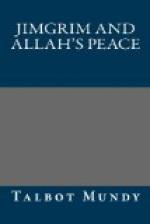There was goose-flesh all over me, and I did not even try to look unembarrassed. A man’s wits, if he has any, work swiftly when he looks like being torn to pieces at a moment’s notice. It seemed to me that the less insolent I appeared, the less likely they were to vent their wrath on me. I tried to look as if I didn’t understand I was intruding—as if I expected a welcome.
“Good!” Anazeh whispered in my ear. “You do well.”
There was a murmur of remonstrance. The sheikh who had dared to rebuke Anazeh found the resentment turned against himself. Somebody told him sharply to mend his manners. Anazeh, shrewd old opportunist, promptly directed the servant to place cushions on the edge of the carpet, in front of the first row of those who wished to appear important. That obliged the front rank to force the men behind them backward, closer to the wall, so that room could be made for us without our trespassing on the forbidden gangway.
So I sat down in the front row, five cushions from Abdul Ali. Anazeh squatted beside me with his rifle across his knees. Then Mahommed ben Hamza forced himself down between me and the man on my left, using his left elbow pretty generously and making the best of the edges of two cushions. As far as I could see there were not more than half-a-dozen other men in the room who had rifles with them, although all had daggers, and some wore curved scimitars with gold-inlaid hilts.
As soon as I could summon sufficient nerve to look about me and meet the brown, conjecturing eyes that did not seem to know whether to resent my presence or be simply curious, I caught the eye of Suliman ben Saoud in the front row opposite, ten or twelve cushions nearer the door than where I sat. He did not seem to notice me. The absence of eyebrows made his face expressionless. He didn’t even vaguely resemble the Major James Grim whom I knew him to be. When his eyes met mine there was no symptom of recognition. If he felt as nervous as I did he certainly did not show it behind his mask of insolent indifference.
There was still a good deal of muttered abuse being directed at Anazeh. The atmosphere was electric. It felt as if violence might break out any minute. Abdul Ali seemed more nervous than any one else; he rocked himself gently on his cushion, as if churning the milk of desire into the butter of wise words. Suddenly he turned to the sheikh on his left, a handsome man of middle age, who wore a scimitar tucked into a gold-embroidered sash, and whispered to him.
Ben Hamza whispered to me: “That sheikh to whom Abdul Ali speaks is Ali Shah al Khassib, the most powerful sheikh in these parts. A great prince. A man with many followers.”
Ali Shah al Khassib called for prayer to bring the mejlis to order. He was immensely dignified. The few words he pronounced about asking God to bless the assembled notables with wisdom, in order that they might reach a right decision, would have been perfectly in place in the Capitol at Washington, or anywhere else where men foregather to decide on peace or war.




